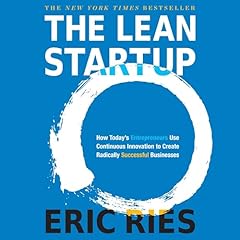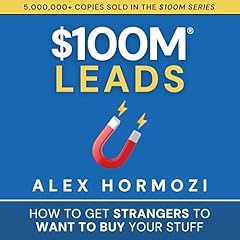
Zero to One
Notes on Startups, or How to Build the Future
Impossible d'ajouter des articles
Échec de l’élimination de la liste d'envies.
Impossible de suivre le podcast
Impossible de ne plus suivre le podcast
3 mois pour 0,99 €/mois
Acheter pour 12,26 €
-
Lu par :
-
Blake Masters
-
De :
-
Peter Thiel
-
Blake Masters
À propos de ce contenu audio
#1 NEW YORK TIMES BESTSELLER • “This book delivers completely new and refreshing ideas on how to create value in the world.”—Mark Zuckerberg, CEO of Meta
“Peter Thiel has built multiple breakthrough companies, and Zero to One shows how.”—Elon Musk, CEO of SpaceX and Tesla
The great secret of our time is that there are still uncharted frontiers to explore and new inventions to create. In Zero to One, legendary entrepreneur and investor Peter Thiel shows how we can find singular ways to create those new things.
Thiel begins with the contrarian premise that we live in an age of technological stagnation, even if we’re too distracted by shiny mobile devices to notice. Information technology has improved rapidly, but there is no reason why progress should be limited to computers or Silicon Valley. Progress can be achieved in any industry or area of business. It comes from the most important skill that every leader must master: learning to think for yourself.
Doing what someone else already knows how to do takes the world from 1 to n, adding more of something familiar. But when you do something new, you go from 0 to 1. The next Bill Gates will not build an operating system. The next Larry Page or Sergey Brin won’t make a search engine. Tomorrow’s champions will not win by competing ruthlessly in today’s marketplace. They will escape competition altogether, because their businesses will be unique.
Zero to One presents at once an optimistic view of the future of progress in America and a new way of thinking about innovation: it starts by learning to ask the questions that lead you to find value in unexpected places.

Vous êtes membre Amazon Prime ?
Bénéficiez automatiquement de 2 livres audio offerts.Bonne écoute !
Commentaires
– The Economist
"An extended polemic against stagnation, convention, and uninspired thinking. What Thiel is after is the revitalization of imagination and invention writ large…"
– The New Republic
"Might be the best business book I've read...Barely 200 pages long and well lit by clear prose and pithy aphorisms, Thiel has written a perfectly tweetable treatise and a relentlessly thought-provoking handbook."
– Derek Thompson, The Atlantic
“This book delivers completely new and refreshing ideas on how to create value in the world.”
- Mark Zuckerberg, CEO of Facebook
“Peter Thiel has built multiple breakthrough companies, and Zero to One shows how.”
- Elon Musk, CEO of SpaceX and Tesla
" Zero to One is the first book any working or aspiring entrepreneur must read—period."
- Marc Andreessen, co-creator of the world's first web browser, co-founder of Netscape, and venture capitalist at Andreessen Horowitz
"Zero to One is an important handbook to relentless improvement for big companies and beginning entrepreneurs alike. Read it, accept Peter’s challenge, and build a business beyond expectations."
- Jeff Immelt, Chairman and CEO, GE
“When a risk taker writes a book, read it. In the case of Peter Thiel, read it twice. Or, to be safe, three times. This is a classic.”
- Nassim Nicholas Taleb, author of Fooled by Randomness and The Black Swan
“Thiel has drawn upon his wide-ranging and idiosyncratic readings in philosophy, history, economics, anthropology, and culture to become perhaps America’s leading public intellectual today”
- Fortune
"Peter Thiel, in addition to being an accomplished entrepreneur and investor, is also one of the leading public intellectuals of our time. Read this book to get your first glimpse of how and why that is true."
- Tyler Cowen, New York Times best-selling author of Average is Over and Professor of Economics at George Mason University
"The first and last business book anyone needs to read; a one in a world of zeroes."
- Neal Stephenson, New York Times best-selling author of Snow Crash, the Baroque Cycle, and Cryptonomicon
"Forceful and pungent in its treatment of conventional orthodoxies—a solid starting point for readers thinking about building a business."
- Kirkus Reviews
Super interessant! A lire!
Une erreur s'est produite. Réessayez dans quelques minutes.
Excellent!
Une erreur s'est produite. Réessayez dans quelques minutes.
Clearly some BS trying to explain why he did it right with self-centered pieces of evidence that couldn't be proved or disproved.
what did I got ?
A convincing piece essay on philosophical politic.
Yep. This book is less about start-ups than about the current society and how to improve it. There is still a recipe for exponential grow of start-up but it felt that it was here to not disappoint the reader and I believe the main point of this book is much bigger and much more important than "how to succeed in late capitalism".
I believe that this book is required to understand the complexity of our society and why the collapse seems inevitable and people that have the power to prevent it won't do anything about it.
a good surprise, and a great book
Une erreur s'est produite. Réessayez dans quelques minutes.
Ce livre apprend à penser différemment et aide à comprendre comment créer une start up se démarquant d'un environnement concurrentiel pour générer une croissance virale, exponentielle et durable !
Très instructif pour qui veut entreprendre!
Une erreur s'est produite. Réessayez dans quelques minutes.
But very interesting if you are founding a company :)
To read with very critic eyes.
Une erreur s'est produite. Réessayez dans quelques minutes.

























